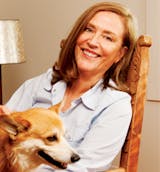For many years I had a fairly basic operating definition of what a real friend was. If I got thrown into jail in Arkansas, a real friend would come and bail me out.
No one has very many stalwarts in her life. I was lucky that I acquired five by birth—two sisters, three brothers—because, growing up, I didn’t make many friends of any variety outside the gene pool. As a military brat, I was uprooted constantly. Many such brats become kudzu-like in their ability to take over whatever alien landscape they are repotted into and be elected head cheerleader by the end of second period. I was the other type: a twitchy introvert with a number of “nervous complaints,” more shrinking violet than kudzu.
Dreaming of busting into hot games of four square and red rover, I asked my mother for the secret to making friends. “To have friends,” she answered, “you must be a friend.” Though I existed in a state of vigilant friendship preparedness, no actual friends were forthcoming. This left me to conclude that her strategy probably worked a lot better if you were a beautiful, charismatic Army nurse who had been engaged half a dozen times—once to a boy-general who played the saxophone.
If you haven’t figured out by now where I’m going with this, you are not one of the “members” who recently helped Facebook hit the 200 million mark. I signed on last summer after my publisher suggested that I needed to do some “social networking” to promote my new novel. Wanting to find out what sorts of vaccinations and prophylactics might be needed before I began working my nets, I consulted Shri Googlenami. He directed me to the Polynesian guru Wikipedia, who enlightened me thusly: “Social network analysis views (social relationships) in terms of nodes . . . ” This made me worry whether my lymphatic system was up to such an activity. Fortunately, I had a human of the teen persuasion right in my own house to give me a fuller understanding of the phenomenon. “Don’t worry, Mom. I’ll make a Facebook page for you.”
Facebook? Wasn’t that the colossal time sink for the terminally narcissistic? The instant I was up and running, however, I wondered why I had ever resisted. Guess which FB demographic is growing most rapidly? If you said “women 55 and older,” hurray! You just won a collagen injection into the body part of your choice.
A medium that is about nothing but connecting with other people and sharing the most microscopic minutiae from your life? Where use of your cat’s photo as a stand-in for yourself is acceptable? My people, the mom/grandmom demo, should have invented Facebook. That young, techie males beat us to it is as if video games had been created at book clubs—as if we’d all put aside The Memory Keeper’s Daughter in favor of cobbling together Grand Theft Auto. But since we read Water for Elephants instead of inventing Facebook, I have to say thank you to the wizardly young ones of the tribe for bestowing upon your elders the magic of the Friendship Weaver. We honor you for sharing with us the power to learn which Led Zeppelin song we are and how our best friend in third grade feels about the Spicy Chicken Go Wrap she had for lunch.
Once I became a “member,” I rapidly acquired a gazillion friends. This made me feel popular until I noted that some of my new pals had names like KGSR-FM and the Toronto Quarterly—and that not a single one of them is on my Arkansas bail list. (Toronto Quarterly, have I misjudged you?) Further examination also revealed that the bulk of my posse was composed of other writers. Like particularly dim rug merchants, we had all elbowed our way into this teeming marketplace, then ended up trying to sell rugs to one another.
Since a pulse and absolutely zero discrimination seem to be the only requirements, I probably need to think of a new name for all my virtual buds. Maybe “frind”? (So close to “friend” yet still so far away.) Perhaps I should crib from Kurt Vonnegut and call my frinds a “granfalloon.” In Cat’s Cradle, the sainted visionary described a “granfalloon” as a bunch of people who believe they have a connection where no real connection exists. He uses the example of Hoosiers, people from Indiana. Since they have no true spiritual destiny in common, they actually have nothing in common.
Though, really, when you think about it, aren’t all friendships virtual? Say, for example, one were to have a best friend in high school who was a major badass and responsible for introducing one to Ripple Pagan Pink and pot of such a low quality that it came in the handy shoe box size, as well as the concept of phoning the attendance office of one’s penal colony of a high school and pretending to be one’s mother to inform them that one had cramps and would not be attending classes that day. Then, just theoretically, imagine that one were at a twentieth high school reunion. Let’s say that one is eating a meat-derivative snack item skewered on a toothpick frilled with red cellophane fletching when one looks up and discovers said soulmate approaching. Imagine now the ball-shaped nugget lodging in one’s throat because one has inhaled it in one’s astonishment at seeing badass friend dressed in a floor-length, appliquéd corduroy jumper, sporting a Gibson Girl-esque hairdo, which one would not be exposed to again until one glimpsed footage of Child Protective Services raiding the Yearning for Zion Ranch. Would one not be justified in concluding that one had never really known this person any better than one knew one’s gazillion new frinds?
I turned again to the ultimate authority, my human of the teen persuasion. He clued me in thusly: “It’s kind of a loser thing to be on Facebook updating your status every five minutes and to have a million so-called friends.”
“Really? Why?”
“Because it shows that you’re just on Facebook all the time and not seeing your real friends.”
Whew. This attitude was a big relief to me. I could see that my dreams for my son might come true: He might actually acquire a real friend to bail him out when he gets thrown into jail in Arkansas.









